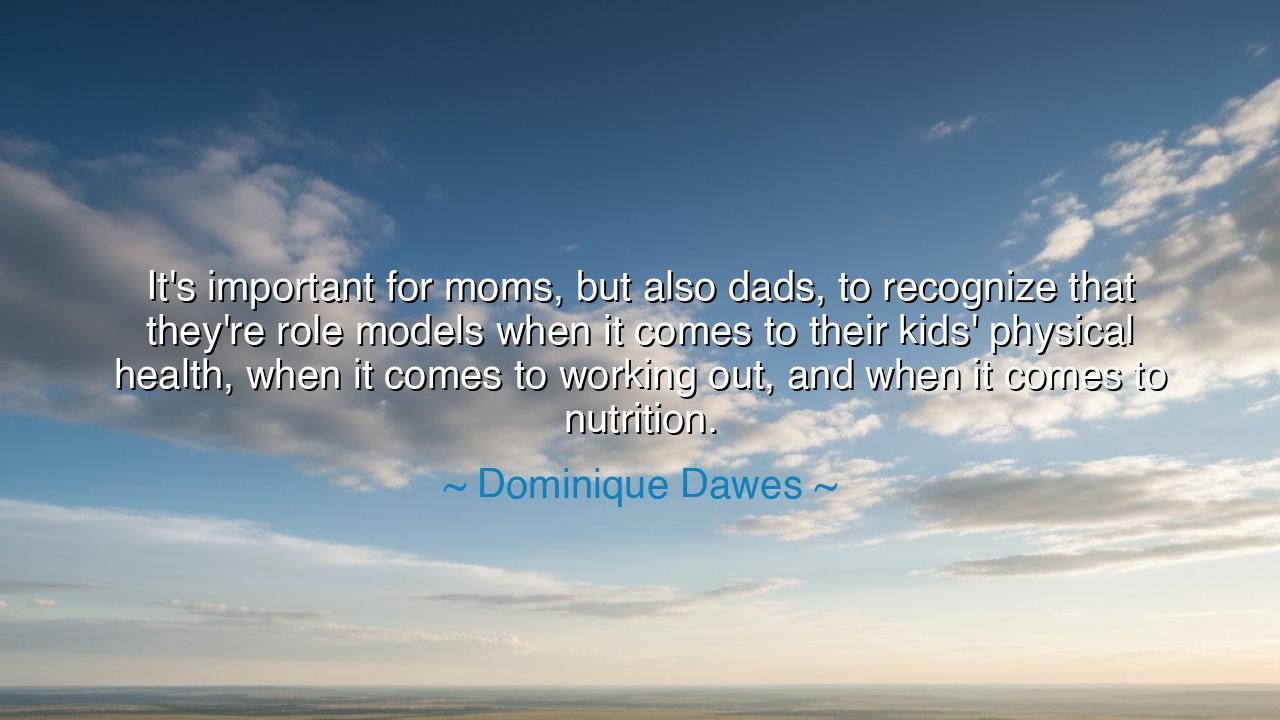
It's important for moms, but also dads, to recognize that they're
It's important for moms, but also dads, to recognize that they're role models when it comes to their kids' physical health, when it comes to working out, and when it comes to nutrition.






In the voice of strength and grace, Dominique Dawes, Olympic champion and guide to future generations, spoke these words of enduring wisdom: “It’s important for moms, but also dads, to recognize that they’re role models when it comes to their kids’ physical health, when it comes to working out, and when it comes to nutrition.” These are not the idle musings of an athlete, but the heartfelt reflection of one who has lived by discipline, resilience, and care for the body as a temple of life. In her words echoes the timeless truth that the parent is the first teacher, and that the lessons of the body are no less sacred than those of the heart or mind.
The origin of this quote lies in Dawes’ own journey — from a young girl of determination to a woman who became a symbol of perseverance. As one of America’s most accomplished gymnasts, she understood the power of daily habits, of mindful eating, of movement that builds not only muscle but character. Yet when she became a mother, she saw how the lessons of health begin long before the gym — in the quiet acts of everyday life. Children, she realized, do not learn by instruction alone; they learn by imitation. The way a parent eats, the way they rise to move, the way they face fatigue or struggle — all these become the living scriptures of a child’s understanding of well-being. Thus, her message is both simple and profound: that to raise healthy children, one must embody health.
When Dawes says that parents must see themselves as “role models when it comes to physical health,” she speaks of more than fitness. She speaks of a spiritual inheritance — the discipline of self-care as an act of love. For in the rhythm of exercise and the practice of nourishment lies a deeper teaching: that the body is not a vessel to be neglected, but a sacred partner in life’s journey. The child who watches a mother stretch at dawn, or a father choose food with wisdom, learns not only about strength but about self-respect. And through this modeling, the family becomes a circle of renewal, where care for the self becomes care for one another.
History, too, bears witness to this truth. In the ancient Olympic Games of Greece, athletes were not merely celebrated for their victories, but revered as symbols of harmony between body and spirit. Their discipline inspired not only their peers, but their communities — for the Greeks believed that a healthy citizen was the foundation of a healthy state. Likewise, in the homes of Sparta, mothers were taught to tell their sons, “Come back with your shield, or on it,” not as cruelty, but as a reminder that strength of body and courage of soul were intertwined. Dominique Dawes carries that same ancestral wisdom into the modern world — that health is not an individual pursuit, but a legacy.
Her words remind us, too, of the quiet dangers of neglect. When parents abandon their own health, whether through exhaustion or despair, children inherit not only their habits but their hopelessness. The family that eats without awareness or lives without movement soon forgets the joy of vitality. But the family that learns to walk together, cook together, and care together awakens the ancient truth that health is communal. To eat well and move freely is not a privilege; it is a practice of gratitude for the life one has been given. Dawes’ call is not to perfection, but to presence — to show one’s children through example that the pursuit of health is an act of love, not vanity.
And when she includes both “moms and dads” in her wisdom, she restores balance to the sacred partnership of parenthood. Too often, the burden of nurturing is placed upon mothers alone. Dawes, a champion of equality in both sport and spirit, reminds us that fathers, too, must teach care through example. The strength of a man is not shown in his indifference to health, but in his stewardship of it — in his willingness to rise early, to eat mindfully, to show his children that tenderness and strength can dwell in the same heart. Thus, both mother and father, through their daily choices, shape the destiny of those who watch them most closely.
So, O parent, O guardian of the next generation, hear the call of Dominique Dawes. Teach not with speeches, but with your living. Let your children see you walk when the day begins, not for vanity, but for life. Share meals that nourish both body and conversation. Honor your body not as an object, but as the vessel of your love and your labor. For every act of health you choose is a seed planted in your child’s soul — a reminder that life is precious, and that the care of the self is the first act of service to the world.
The lesson of Dawes’ wisdom is eternal: children become what they behold. If they see strength married to kindness, discipline joined with joy, and self-care grounded in gratitude, they will carry those truths into the future. Thus, to be a role model of health is not merely to shape strong bodies, but to raise strong spirits — children who will grow into adults that honor the divine unity of mind, body, and heart. And when such lessons take root, the legacy of one household becomes the strength of a generation.






AAdministratorAdministrator
Welcome, honored guests. Please leave a comment, we will respond soon